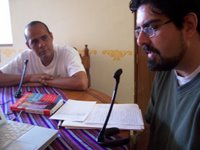Future of Democracy in the Americas


We recorded the interview with Victor Vargas in the middle of July 2006, just a couple of weeks after the July 2 presidential elections in Mexico. The emotions among the Mexican voters were still raw, as evidenced by the public art displays I found in the public squares in downtown Morelia, Michoacan. The time was perfect to talk about the past and future of Latin American democracy. The Letter to Jamaica by Simon Bolivar that I mention in the podcast is an important document in the history of Latin American independence and Victor did well to put it in context. In the Letter, Bolivar calls for Latin America to choose an independent course and develop political institutions that fit the culture and history of Latin America.
The election crisis in Mexico is reminescent of the 2000 election here in the United States. In fact, there have been extremely close elections in several countries in the past few years. I asked Victor about this in private conversation and he told me he thought there is a global political polarization going, fueled by neoliberal globalization policies and the War in Iraq. In Latin America, this polarization, according to Victor, is promoting the rise of leftist politicians such as Hugo Chavez in Venezuela, Evo Morales in Bolivia, and Michelle Bachelet in Chile, and Andres Manuel Lopez Obrador in Mexico. So its not clear whether its possible for Latin America, given the fact of globalization, to fufill the mandate of Bolivar's Letter any longer or whether these figures are, in fact, trying to do just that.
The other aspect that I found quite interesting in Victor's analysis is his point that democracy is more than just political--its a way of life. This means that it takes more than just frequent elections to count a society as democratic. Such an idea echoes the thoughts of American philosophy John Dewey, in his essay Creative Democracy: The Task Before Us, and more recently, Cornel West's Democracy Matters, an except which is here. It raises some deep questions about the success of military interventions in Afghanistan and Iraq. Can democracy take root this way?
The situation in Mexico is unclear at this time. The federal elections tribunal voted in the last week not to do a complete recount of all the votes, as was the preference of Andres Manuel Lopez Obrador. Instead, there is now a recount of approximately 9% of the votes. Lopez Obrador's supporters have staged major protests in the last few weeks, shutting down access to the center of Mexico City and threatening to shut down the international airport and key ministries. A president must be certified by the beginning of September 2006 to take office in December.
Labels: globalization, latin america


1 Comments:
Hi Joseph!
This is insightful ... thanks for sharing and your blogging is a good thing.
Chester
Post a Comment
Subscribe to Post Comments [Atom]
<< Home